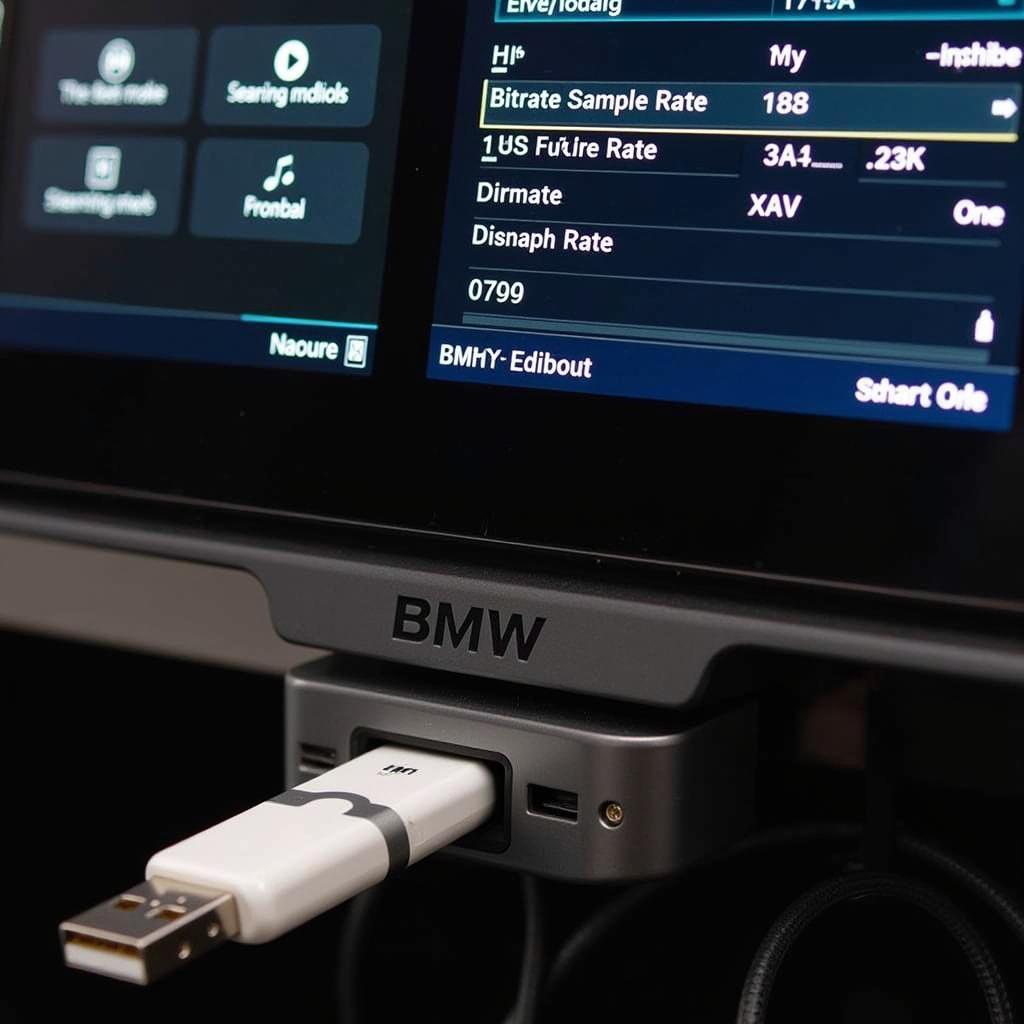Understanding which audio formats your BMW supports is crucial for an enjoyable listening experience. This guide dives deep into BMW supported audio formats, covering everything from common file types to troubleshooting tips.
Understanding BMW supported audio formats can significantly enhance your in-car entertainment experience. Let’s delve into the intricacies of audio compatibility within the BMW ecosystem. This comprehensive guide aims to provide clarity on which formats work seamlessly, potential troubleshooting steps, and best practices for managing your audio files. Navigating the world of digital audio can be confusing, so we’ll break down the essentials to ensure you get the most out of your BMW’s audio system.
Decoding the Supported Audio Formats in Your BMW
BMWs typically support a range of common audio formats, including MP3, WMA, AAC, and WAV. However, specific compatibility can vary based on the model year and iDrive system version. Always consult your owner’s manual for the most accurate information regarding your specific vehicle. Knowing which formats are compatible is the first step to enjoying your music collection on the go.
You can learn more about using a USB stick for audio in your BMW at bmw audio usb stick.
Why Knowing the Right Format Matters
Using unsupported formats can lead to playback issues, error messages, or even a complete inability to play your audio files. Choosing the right format ensures smooth playback, optimal sound quality, and a frustration-free listening experience. It also helps preserve the integrity of your audio files and prevents potential data corruption.
Troubleshooting Common Audio Format Issues
Sometimes, even with supported formats, you may encounter playback problems. This can be due to file corruption, incorrect file extensions, or issues with the USB drive itself. Let’s explore some common troubleshooting steps.
What if My BMW USB Audio Doesn’t Show Artists?
If your BMW isn’t displaying artist information correctly, the issue might lie with the metadata tags within your audio files. Ensure the tags are correctly formatted and contain the necessary information. You can use various software tools to edit and correct metadata tags. This often resolves issues with missing artist names, album art, and track titles. For more detailed information, check out our guide on bmw usb audio doesnt show artists.
Optimizing Your Audio Files for BMW
For the best audio experience, optimize your files for BMW compatibility. This includes using recommended bitrates and sample rates, ensuring proper file organization, and using a high-quality USB drive formatted in a compatible file system like FAT32.
 Optimizing Audio Files for BMW Compatibility
Optimizing Audio Files for BMW Compatibility
Which USB Format is Best for BMW Audio?
Formatting your USB drive correctly is crucial for compatibility. BMW generally recommends FAT32 or exFAT for optimal performance. You can learn more about this on our page dedicated to bmw usb format for audio. Using NTFS might lead to compatibility issues.
“Using the correct file format and a properly formatted USB drive can drastically improve the listening experience in your BMW,” says Michael Becker, Senior Automotive Audio Engineer at Becker Sound Solutions.
Advanced Audio Features in BMWs
Modern BMWs often come equipped with advanced audio features like Bluetooth streaming, Apple CarPlay, and Android Auto. These features offer seamless integration with your smartphone and provide access to a wide range of audio sources. Understanding how to use these features can enhance your in-car entertainment options.
Exploring BMW USB Audio File Format Options
Knowing the specific file formats supported by your BMW’s USB interface is essential. You can find a more detailed breakdown of compatible formats on our bmw usb audio file format page. This knowledge ensures a hassle-free playback experience.
“Understanding the nuances of your BMW’s audio system allows you to fully appreciate the premium sound quality it offers,” adds Maria Sanchez, Lead Car Audio Technician at Sanchez Automotive.
Conclusion
Understanding bmw supported audio formats is essential for an optimal listening experience in your BMW. By following the guidelines and troubleshooting tips outlined in this guide, you can ensure seamless playback and enjoy your favorite music on the road. Remember to always consult your owner’s manual for the most accurate information regarding your specific BMW model.
FAQs
- What is the most common audio format supported by BMWs? MP3 is generally the most widely supported format.
- Can I play FLAC files in my BMW? FLAC support varies depending on the model and iDrive version.
- Why is my BMW not recognizing my USB drive? Check the file system format of your USB drive. FAT32 or exFAT are usually recommended.
- How do I update my BMW’s audio system software? Consult your owner’s manual or contact a BMW dealership for instructions.
- What is the maximum file size supported by BMW’s USB interface? There isn’t a specific file size limit, but it’s recommended to keep files within a reasonable size to avoid potential issues.
- How can I improve the sound quality in my BMW? Optimizing audio files with the correct bitrate and sample rate can improve sound quality.
- Can I play audiobooks in my BMW? Yes, most BMWs support common audiobook formats like MP3 and M4A.
You can explore further information about USB audio interfaces for BMW on our interface audio usb bmw page.
For more information and troubleshooting guides related to BMW audio systems, browse our website CARDIAGTECH for other helpful articles and resources.
Need further assistance? Contact us via Whatsapp: +1 (641) 206-8880, Email: CARDIAGTECH[email protected] or visit us at 276 Reock St, City of Orange, NJ 07050, United States. Our customer support team is available 24/7.
